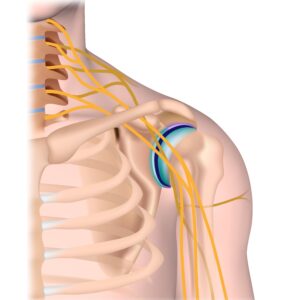The UNC Peripheral Nerve Center is now open. The center is an integrated practice unit that seeks to improve the lives of patients dealing with peripheral nerve disorders. The center’s work will focus on conditions that affect nerves transmitting signals from the brain and spinal cord to the body.

The UNC Peripheral Nerve Center has launched and will serve patients grappling with a range of peripheral nerve disorders, from the straightforward to the most complex. These disorders encompass any conditions that affect nerves transmitting signals from the brain and spinal cord to the body. Recognizable examples include carpal tunnel syndrome and cubital tunnel syndrome. However, peripheral nerves can also fall prey to trauma, tumors or diseases, further highlighting the Center’s critical role in comprehensive care.
Led by director Megan Patterson, MD, the UNC Peripheral Nerve Center has a team of experts with diverse backgrounds in orthopaedic surgery, nonoperative orthopaedics, neurosurgery, physiatry, rehabilitation, neurophysiology, musculoskeletal radiology and hand therapy. Their collaborative efforts ensure that each patient receives a personalized treatment and recovery plan, which may encompass both surgical and non-surgical solutions.
Noteworthy conditions treated at the Center include:
- Carpal Tunnel Syndrome
- Cubital Tunnel Syndrome
- Peripheral Nerve Injuries (including lacerations, gunshot injuries, car and motorcycle accidents)
- Nerve tumors
- Brachial Plexus Injuries
Diagnosing nerve conditions is often a challenging endeavor, as patients may endure pain and limited function for an extended period. To tackle this, the center’s integrated approach starts with a thorough history and physical examination. In many cases, additional diagnostic tests, such as electromyography/nerve conduction study, magnetic resonance imaging or ultrasonography are employed to facilitate a personalized treatment plan designed to maximize each patient’s functional recovery.
Treatment plans include both operative and non-operative methods. Non-operative treatments encompass personalized hand therapy programs, braces, splints and ultrasound-guided injections, all aimed at optimizing function and recovery. Surgical solutions include carpal tunnel release, cubital tunnel surgery, nerve repair and grafting, nerve transfers and peripheral nerve tumor excisions and are performed by one of four subspecialty trained surgeons with backgrounds in orthopaedic hand surgery, plastic hand surgery and neurosurgery.
The UNC Peripheral Nerve Center is open to referrals and appointments. To seek help or refer a patient, please contact the center at PeripheralNerve@med.unc.edu or by phone at 919-966-7130. Fax inquiries can be directed to 919-966-6730. Additional information can be found at the UNC Peripheral Nerve Center website.